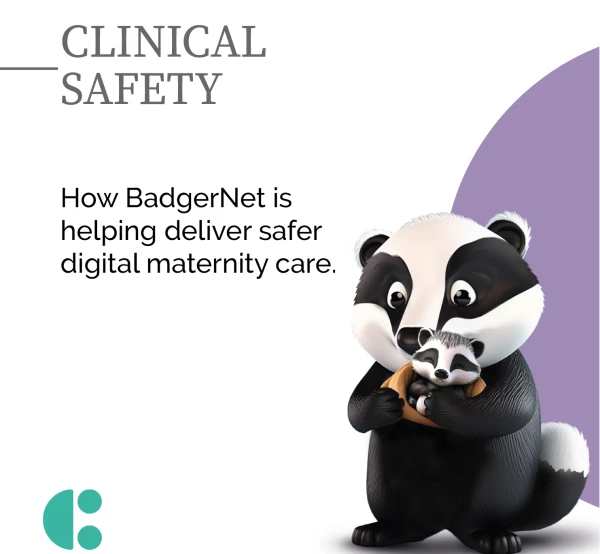How BadgerNet Is Helping Deliver Safer Digital Maternity Care
8th July 2024
Maternity services have led the way in secondary care digitisation with the belief that digitising maternity records and workflows is an integral part of providing high quality and safe maternity services. Maternity services are under huge pressure and scrutiny following a series of inquiries into poor maternity care. Now, more than ever, midwives need to be able to rely on their digital systems, but at the same time, digital systems are rightly in the spotlight as a growing number of clinical safety incidents are implicating them.
BadgerNet is now the Maternity EPR for 60% of births in the U.K, so we have a huge responsibility to ensure that the way we develop and implement our software is as safe as possible. This article outlines the 3 key steps that we take to do this.
Complying with Safety Standards & Processes
The NHS has robust Clinical Safety standards including, but not limited to, suppliers (DCB 0129) and NHS Organisations (DCB 0160). It is crucial that these standards are adhered to and at System C we have a Clinical Safety and Compliance team to ensure we do this. The team consists of five accredited clinical safety officers (CSOs) and Clinical Safety Director who implement and oversee our whole clinical safety management process. The CSOs constantly review, and risk assess throughout the product life cycle and provide 24/7 on call support as part of our continuous safety monitoring process.
Clinical Safety As A Team
It is important to remember that Clinical Safety is all of our responsibility. Beyond our internal safety processes, we look to our large and passionate BadgerNet Community to ensure we deliver the safest possible system. They provide invaluable on the ground feedback on potential safety issues and are an integral part of the design, testing and monitoring process.
Clinical Safety By Design
Our Clinical Product Specialists are as passionate as our User Community and lead the ongoing development of BadgerNet. Having qualified and registered Midwives and Neonatal nurses at the heart of the process provides a deep level of understanding and empathy within product development. This understanding led to the development of a single national maternity record ensuring the same maternity record can be accessed wherever a woman presents for care and women themselves can access their own record. Badger Notes is currently accessed by over 50,000 women per day and this continuity of care, transparency and oversight further enhances safety.
We take our clinical safety responsibility very seriously. Transparency, communication and continuous improvements are crucial to our ongoing efforts to deliver the safest possible maternity system.
Next Steps
On Tuesday 16th July, we hosted a webinar: 'BadgerNet Maternity: How the single pregnancy record supports clinical safety', the recording of which can now be watched on demand.
Explore a range of blogs covering a diverse range of topics - from the latest industry trends to expert insights and captivating stories.
Please get in touch if you have any questions around clinical safety and our BadgerNet and CareFlow products.
Contact Us


